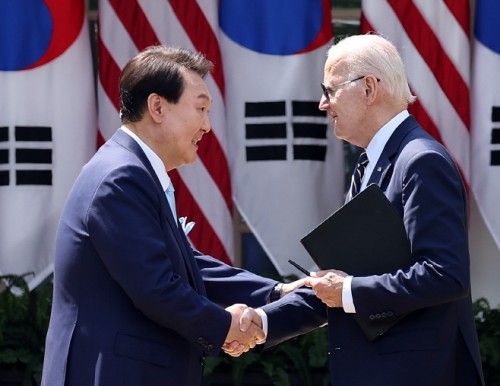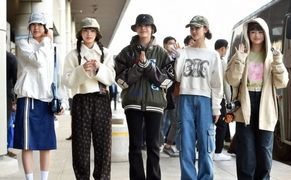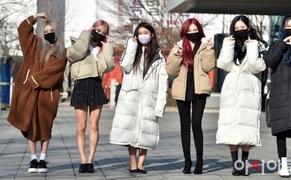 |
| South Korean President Yoon Suk-yeol and U.S. President Joe Biden shake hands at a joint press conference held at the White House Rose Garden on April 26, 2023./ Source: Yonhap |
AsiaToday reporter Lee Wook-jae
South Korean President Yoon Suk-yeol and U.S. President Joe Biden wrapped up their summit in Washington D.C. on Wednesday. Political observers say the summit has provided an opportunity to upgrade the Korea-U.S. alliance, which marks its 70th anniversary, as it has come up with ways to cooperate between the two countries in various fields.
While the Korea-U.S. alliance has remained as a ‘value-based alliance’ limited to the security sector, the summit has expanded the scope of the alliance into five areas, including economy, technology, culture and information, as well as security cooperation.
After the 80-minute summit, Yoon said the summit talks will set up a “historic milestone for the alliance starting anew as a global alliance.”
On the deepening security crisis on the Korean Peninsula, the two leaders agreed to implement the U.S.’ extended deterrence through the ‘Washington Declaration.’ In response to the North Korean threat, the two countries agreed to establish a Nuclear Consultative Group (NCG) in order to operate the new extended deterrence system in more detail. An official from the presidential office said this is the first case in which the U.S. declared with a specific plan to realize nuclear deterrence to certain allies and promised directly by the president.
The two countries will regularly and continuously deploy U.S. strategic assets to the Korean Peninsula. “Our people will effectively feel that they are sharing nuclear weapons with the United States,” Principal Deputy National Security Adviser Kim Tae-hyo told reporters. The White House also said the U.S. is providing “unprecedented commitments.”
The diversification of bilateral cooperation measures is considered different from previous joint statements of the leaders of the two sides. The latest joint statement includes economic security, advanced technology, human exchange, and regional and global cooperation. The two countries have further strengthened their economic and security partnership. The two leaders agreed on establishing a ‘Korea-U.S. semiconductor forum’, promoting ‘friend-shoring’, seeking mutually beneficial solutions to the Inflation Reduction Act (IRA) and CHIPS and Science Act.
In addition, the two leaders agreed to establish a dialogue for next-generation emerging and core technology and decided to deepen people-to-people ties and cultural content cooperation to realize a cultural alliance. They agreed institutional support to expand exchanges between future generations, businessmen, and educators and decided to invest a total of $60 million that aims to serve 2,023 Koreans and 2,023 Americans in the fields of humanities and social sciences, as well as science, technology, engineering, and mathematics (STEM). They also expanded the scope of alliance to cyberspace by establishing a U.S.-Korea Strategic Cybersecurity Cooperation Framework.
#Yoon Suk-yeol #Joe Biden #Washington Declaration #alliance
Copyright by Asiatoday
Most Read
-
1
-
2
-
3
-
4
-
5
-
6
-
7





















